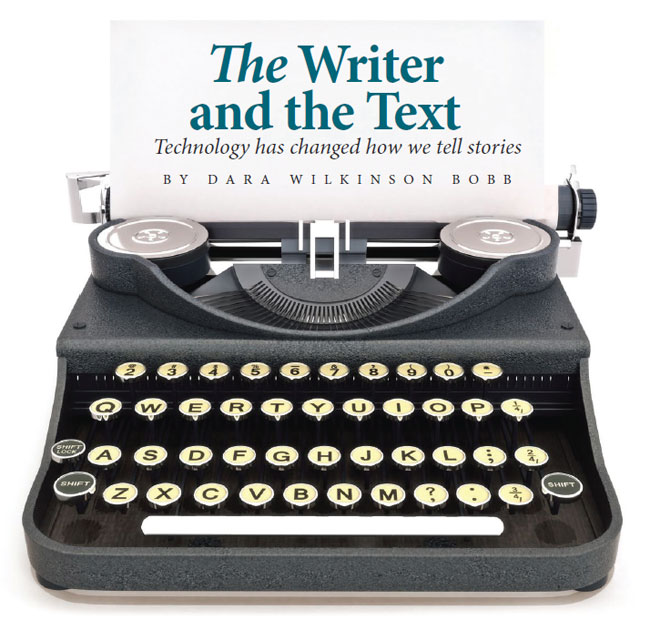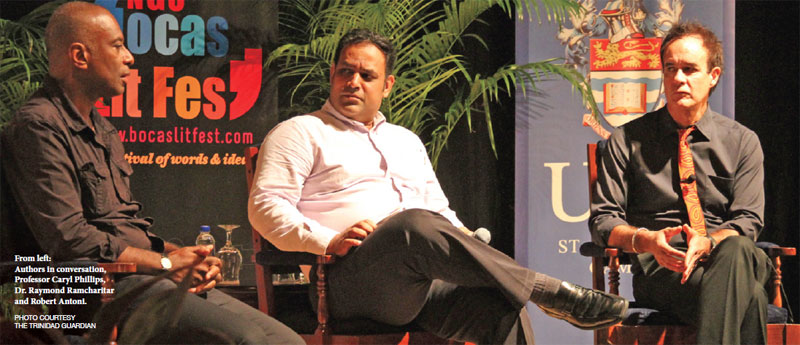

Caryl Phillips and Robert Antoni, both writers of the Caribbean diaspora creating innovative historical fiction and recasting Caribbean-ness, came together for a literary conversation recently.
Professor Phillips, a writer of fiction and non-fiction, is a Yale professor, who was born in St. Kitts and grew up in Britain, and has authored 11 novels as well as plays and essays. He read from his 2015 novel “The Lost Child.”
As he discussed his inspiration for the book, he mentioned that he has often speculated whether the name Liverpool crops up throughout the Caribbean as street signs and other touch-points harking back to England. He grew up ten miles from where the Brontes had lived. As a youth someone gave him a line drawing of Emily Bronte and he always imagined that there was some kind of umbilical connection between his desk which held this photo and her home ten miles away.
The biggest question in Emily Bronte studies, said Phillips, is who was this seven-year-old boy found on the docks of Liverpool where he grew up and who became Heathcliff of Bronte’s famous “Wuthering Heights.” Increasingly, Phillips thought about life growing up in the shadows of the Yorkshire moors. Out of these musings, “The Lost Child” was crafted.
“I didn’t start off with the idea or theme or structure. I started with the idea that has bedeviled scholars for years: Who on earth was Heathcliff? Who on earth was this raggedy boy that started on the docks and then became this romantic figure of canonical literature?” said Phillips.
Yet beyond historical circumstances and cold data, Phillips wanted to craft a novel that would explore the humanity integral to and beyond the question of Heathcliff’s origins.
“I started with this question but then it became and had to become something more in conversation with the human heart,” he said.
He had perceived that non-white children growing up in Britain in his time seemed to echo the Heathcliff story. The parallel is that the pervasive reading of Heathcliff is as a wild, passionate and brooding character, dark and mysterious, and certainly a poor fit into the staid and mannered English society of that time.
In making this link between fiction and current realities, between history and present contexts, he noted that a part of writing fiction is that you are exploring the landscape and topography of your own life. It isn’t to be taken lightly. It is a terrific responsibility.
Robert Antoni, similarly a celebrated writer, is an author whose fiction’s terrain is the British West Indies. He has written five novels. Antoni read from his novel “As Flies to Whatless Boys,” which is also a work of historical fiction.
Antoni literally reaches backwards to tell the story of the Tuckers, a family in his mother’s lineage. Around 1845 inventor John Adolphus Etzler, a Londoner, convinces the Tuckers to migrate to Trinidad to help form a utopia based on his machines. The machines were powered by nature and were supposedly guaranteed to change the Tropics into a “proper” English garden. The narrator is middle-aged Willie Tucker who is telling his son how he managed to get to Trinidad in his teens.
“My problem was how to get all of that research out of the way and invent the story from scratch,” said Antoni.
At first, he was hesitant to write the story because his antecedents were estate owners and he knew he would “have to talk about slavery and did not want to.” However, he learned that the Tuckers came after emancipation and “precisely because the slaves had been emancipated.” Etzler could not condone slavery, he said. Indeed, the inventor and family arrived in exactly the same year as the first ship of indentured labourers arrived in Trinidad from India.
“The difference between writing non-fiction or history and a novel, is a novel can only be personal. A part of my process is to have these touchstones of personal and immediate connection that make all the imaginings anchored and allow me to push ahead,” he said.
“There is always this question of who you are writing for. Are you writing for an audience? Are you writing for yourself? You write for the story that’s being told… at least I do. I have to believe that wherever I take it people will respond even if they have never heard of Trinidad. And they do respond.”
In terms of how an audience receives work, Phillips added that between 1950 and 1970 in Britain, 70 novels by West Indians were published, and that as writers mounted the platform to present their work there were probably pre-conceptions as to what they would say. Now literature has become more globalized and national and regional boundaries have become less important. Old conceptions of what constituted a region’s writing will be questioned and perhaps changed, he said.
Antoni’s own form of experimentation with regional writing, of pushing the envelope regarding expectations, is with the vernacular as he feels the form has to reflect the content.
“The vernacular is a hybrid language and I am looking for a hybrid form to reflect a very hybrid West Indian consciousness and sensibility,” he said. He is not the first to have done this, but it remains a gamble in the business of publishing where publishers can be unwilling to have your book translated for other markets.
Both writers commented on the role of technology in our mediated lives. Responding to a question from the audience on teenagers, technology, and literature, Antoni said, “Part of me feels all your anguish. They go out for dinner with you and they are on their phones all the time. The problem with the phones is if all of your relationships are virtual, you cannot look anyone in the eye.”
Regarding experimentation, he felt that, “Technology is going to transform the way we tell our stories and the way they will be transmitted. So how can we find a way to make electronic literature writerly? That is my question and that is hopefully the question your children will answer if they find a way in between their texting.”
Indeed, though writing historical fiction, Antoni’s themes may be considered more forward looking, more contemporary, than harking back to more traditional themes of colony and writing-back to Europe.
“The colonial chip-on-your-shoulder is something my parents had and my grandparents had but I do not have,” he said, individuating himself from the conventional expectations of Caribbean literature.
Phillips echoed this idea of contemporary imaginative licence, but with a more philosophical slant, feeling that writing can speak to our common humanity.
“Part of the great moral purpose of literature is to imagine yourself into the life of people who are not you,” he said, and that creates empathy. He believes that literature reminds us that [William] Faulkner’s definition of the novel as problems of the human heart in conflict with itself is a universal issue… a human issue.
“That is not what text, twitter, facebook and instagram are about,” he said, pointing to their narcissistic nature.
“They’re all about the selfie!” was the response.
Perhaps the digirati and youth who, always connected to their circle of friends globally, might find that expression in digital text and images is the new literary frontier. As global boundaries become more fluid through technology, diversity is increasingly embraced, and niches and tribes celebrate their difference from the mainstream. Many book lovers, however, will continue to cherish that new-book-smell, the feel of the page beneath fingertips, and the way re-reading an old favourite reconnects you to other minds and cultures.
And as they creatively recast our Caribbean pasts and unearth their truths and insights, writers Caryl Phillips and Robert Antoni are connecting human hearts across the globe, word by word.

One of the aims of post-colonial literature is to examine the way Europe maintained its power. It is also concerned with re-reading and re-writing the past. This understanding of historical fiction, and in particular the works of authors Caryl Phillips and Robert Antoni, was shared by Dr. Kumar Mahabir, Assistant Professor UTT, at a reading and dialogue for both authors held at the UWI St. Augustine campus. The event titled “A Literary Conversation” was held on October 3, 2015, by the Anthony N. Sabga Caribbean Awards for Excellence, the Bocas Lit Fest, the University of Trinidad and Tobago and The UWI. The Chair for the proceedings was Professor Emeritus Funso Aiyejina and the moderator was Dr. Raymond Ramcharitar.
Professor Phillips was a Commonwealth Prize recipient a decade ago, and was named the ANSA Caribbean Award for Arts and Letters Laureate in 2013. Robert Antoni was the 2014 OCM Bocas Prize winner and has been the recipient of a Guggenheim Fellowship, the Commonwealth Writers Prize, and the NALIS Lifetime Literary Award among other accolades.
Dara Wilkinson Bobb is a parttime assistant lecturer in the Writing Centre of the Faculty of Humanities and Education, UWI, St. Augustine. |





